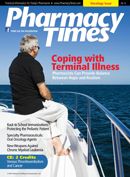Publication
Article
Pharmacy Times
Be Prepared to Respond to an Error
Author(s):
The lack of response to an error is often the most upsetting part for a patient.
The lack of response to an error is often the most upsetting part for a patient.
When patients report medication errors to the Institute for Safe Medication Practices (ISMP), they are usually more upset with the response, or lack of response, they receive from the pharmacist or pharmacy management than with the actual error itself. All too often, pharmacists, technicians, and management (including corporate) have not been educated about how to respond to an error.
For example, a pharmacist incorrectly dispensed Zyrtec (cetirizine), an antihistamine, instead of the antifungal Lamisil (terbinafine). When the patient brought the possibility of an error to the pharmacist’s attention prior to leaving the store, the pharmacist did not investigate the situation and responded, “I would not have filled it if it wasn’t correct.” The patient later took the wrong drug.
Patients are looking for open and honest communication from their health care providers when they have questions about their medications or when an actual error may have occurred. In fact, the attention and concern demonstrated to the patient and family through the admission of an error may, at least to some extent, mitigate the legal consequences of the error.
As patients are continually encouraged to be more active in their care and serve as a final check at the pharmacy, it is critical that pharmacy staff prepare for the inevitable occurrence of a medication error.
SAFE PRACTICE RECOMMENDATIONS
Every pharmacy should have written policies and procedures for handling medication errors, and more importantly, these procedures need to be seen, read, and understood by every member of the pharmacy team. The policies and procedures need to be reviewed regularly for appropriateness and updated to reflect changes in workflow and additions of technology. They should contain guidance about what to say and do, as well as what not to say or do.
General principles to have in written procedures, regarding how to respond to an error, include:
• Define staff roles in response to a possible or actual medication error, including a description of how staff should respond to a patient’s questions and concerns. Also define how management should respond and investigate the cause of an error.
• Have a written policy on disclosure that is agreed upon and followed by management and staff.
• Define when others (eg, prescriber) should be notified of an error.
• Respond to the report immediately with concern. Assure the patient that the situation is important and a priority.
• Remedy the immediate situation with truth and honesty. Be direct and open with the patient reporting the error.
• Consider teaching everyone who is involved in responding to an error to use statements such as: “Please let me explain what we believe happened and how we plan to fix it,” or “At this point, I cannot answer how this happened, but I promise you I will look into it and get back to you.”
• Document and report the event and response. Some specific actions to consider include: 1) document the date, time, and specifics of the event; 2) report the event using the pharmacy’s internal reporting system; 3) notify supervisors, risk management, and the prescriber when necessary; 4) make a note in the patient’s profile so that staff is aware, especially when the patient returns to the pharmacy; and 5) report the event confidentially to ISMP, when appropriate, to warn others outside of the organization of a possible error that may be preventable.
• Alert staff to the situation. Share and discuss event details, possible contributing factors, temporary and subsequent prevention strategies, and procedural changes.
• Support staff involved in the incident. Offer those involved with the error access to employee assistance programs.
• Practice and role-play possible scenarios using the established guidelines.
Michael J. Gaunt, PharmD Medication Safety Dr. Gaunt is a medication safety analyst and the editor of ISMP Medication Safety Alert! Community/ Ambulatory Care Edition.
Subscribe to Newsletter
Pharmacy Times and the Institute for Safe Medication Practices (ISMP) would like to make community pharmacy practitioners aware of a publication that is available. The ISMP Medication Safety Alert! Community/ Ambulatory Care Edition is a monthly compilation of medication-related incidents, error-prevention recommendations, news, and editorial content designed to inform and alert community pharmacy practitioners to potentially hazardous situations that may affect patient safety. Individual subscription price is $52 per year for 12 monthly issues. Discounts are available for organizations with multiple pharmacy sites. This newsletter is delivered electronically. For more information, send an e'mail message to [email protected], or contact ISMP at 215-947-7797.

Newsletter
Stay informed on drug updates, treatment guidelines, and pharmacy practice trends—subscribe to Pharmacy Times for weekly clinical insights.






